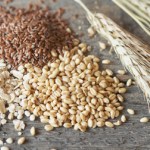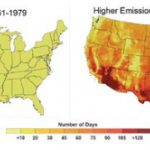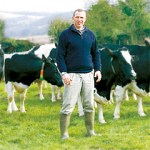agriculture
I'm conflicted about Nicholas Kristof's recent op-ed about antibiotic resistant organisms. On the one hand, Kristof is one of the only national columnists to raise this issue at all. On the other hand, I found his most recent column somewhat confusing--and I'm an expert in this area (I also think he's jumping to unfounded conclusions, but more about that later in the post). I think this is largely an effect similar to playing "telephone": information is being transferred multiple times from the primary source and finally conveyed by someone with no biological training. So what I'm going…
Thank you Bill Gates for your work on behalf of farmers and.... for blogging on our book, Tomorrow's Table!
If you don't have time to read the full reviews, here are a few excerpts:
"This is an important book for anyone who wants to learn about the science of seeds and the challenges faced by farmers... I think anyone who reads this book will be convinced of the authors' sincerity and intelligence - even if, like me, you never try any of the cool-sounding recipes...
I gained an understanding of the history of organic farming and learned about some of the very clever ways organic farmers…
I have an enormous amount of respect for Stuart Staniford, who I think is one of the best minds working on our collective ecological crisis. That said, we've had some serious debates, because I've tended to think that our situation, particularly our longer term food situation, is more serious than Staniford has - but those debates on my end have always included just a profound gratitude for the kind of analytic work he does.
(Days over 100 degrees in projected high emissions scenarios)
Staniford has done a fabulous review (Note: apologies for linkage problems, they should now be fixed!)…
Note: 1 1/2 feet of snow so far and still falling - we may get more than three by the end (the words "in the higher elevations" are generally the ones you want to listen to when forecasts are made for my area). Power so far, but not expecting it to last. Smaller dog must boing around in snow to keep from being fully submerged. Snowballs are being made. We're getting ready for the arrival of our new buck, Ring Bearer (no, I didn't name him) and for a quantity of baby chicks and ducklings. And it is time to start tomatoes, because despite what it looks like, there will be green stuff out…
Because of the enormous impact of agriculture on climate change, pick up any book about "green" solutions and you'll find the suggestions that you grow a vegetable garden. Bang into the "we can't go on as we are" end of the environmental movement (mine), and you'll see the general assumption that growing food is part of any process of adaptation to lower resource use.
This often then morphs into the assumption that all of us should be able to grow all of our food, or a vast majority of it - that sustainability means the country life for everyone. You might think that because I do produce a…
Many of us in the Global North probably have a mental image attached to the word "farmer." Here's a pretty good approximation of most of our impressions of what constitutes "the average farmer."
Most of us probably don't realize that the "average farmer" on a world scale looks rather different. Here's an approximate of what the average farmer looks like:
Or maybe she looks more like this:
Women feed the world, and I mean that quite literally. Worldwide, according to the UN FAO, more than 50% of all the food grown worldwide is produced by women, who constitute close to 60% of the world'…
In many ways the enormous outpouring of support for Haiti after the earthquake was very moving. In other ways, not so much - consider the International community's total lack of interest in whether Haitians will be able to feed themselves in the upcoming year - "We're very happy to send our surgeons, engineers and food aid - but hey, when we're done, we're done" seems to be the dominant worldview, as the UN reports:
"At a time when Haiti is facing a major food crisis we are alarmed at the lack of support to the agricultural component of the Flash Appeal," UN Food and Agriculture Organization…
I hear it is snowing in 49 out of 50 states today. And this, just after the big snow in Washington. Is climate change to blame?
According to climate scientists, we cannot extrapolate based on the events of 1 week.
Still, even if we choose to discount the dramatic weather of this week, it is increasingly clear that the climate is changing and that we must rethink agriculture.
Population experts anticipate the addition of another roughly 3 billion people to the planet's population by mid-21st century. However, the amount of arable land has not changed appreciably in more than half a…
Note: This is a rerun from ye olde blogge. As the book deadline approaches, expect to see some of my previous opi making appearances here. Since I've got more than 1000 of them, it shouldn't be too boring, I hope. I hope this one will help some of you in garden planning this year.
There are a million gardening books out there to tell you how to grow perfect tomatoes and lettuces. And that's important, especially after the blight disaster last year - in my house, salsa is a food group. But the reality is that for those of us attempting to produce a large portion of our calories, tomatoes…
At first glance, swept yards, derived from Africa, at one time traditional in the south and now mostly the province of a few, aging African-American southerners; and Cottage Gardens, invented in Britain under the feudal system and now evolved into a trendy " flower garden style" meaning mostly a mix of abundant plants and mulched paths as seen in any supermarket magazine, have nothing to do with one another.
But looking past the obvious, the two of them have a great deal in common indeed. Both emerged from the need to make good use of a comparatively smaller piece of land for a family with…
My fellow Science blogger Eric Michael Johnson has a superb post up about possible strategies for reforestation in Haiti - and the enormous economic barriers to doing so:
In other words, by providing a 25% subsidy for seed and a 75% subsidy for fertilizers both large and small farms would improve their income while at the same time improving the conditions of their environment. These subsidies would also be less expensive than the current practice of punishing infractions.
"The modeling results indicate that agricultural subsidies tied to forest conservation can provide opportunities for…
Buying seeds here is not a quick process. First there's the perusal of all the seed catalogs, the dreaming and fantasizing with my garden porn. Then there's the marking of all the things I'd like to try this year, which would get me a seed order about 4 times bigger than I could possibly plant, even on my farm. Then there is the actual ordering, and the occasional banging against reality, like the fact that I waited too long to get that variety or this one. I'm winding up the process now, and starting to get to open the boxes of seeds.
For those of you who have ordered or at least…
One of the roles our farm has, rather unintentionally, taken on is as sanctuary (mostly temporary) for the unwanted roosters of friends and loved ones. First, there was Cora, who turned out to be Corey - and not permissable under town regulations. My step-mother relocated him here and found Eunice, a hen, and Corey lived a happy life on our farm for about a year, until he got aggressive and started attacking my children. After he jumped Asher, then two, as Asher puts (still with some satisfaction), "We ate Corey." There are far too many gentle animals in the world you can't keep to hold…
In my "Response to Zuska" in comments we've had some interesting discussion of whether gay, lesbian, bi and transgender folk will need to/be able to integrate successfully into rural communities, and I thought it was worth a blog post here as well, for folks who may not have read all the comments. As you all know, I don't think everyone has to re-ruralize - in a recent post at ye olde blogge, I wrote that we should seriously reconsider some cities. and that people who don't feel comfortable in the country may not want to force it. So I don't personally think that everyone does have to move…
The best estimate I've seen is that in 2009 alone, we had more than 2 million first time gardeners, and from 2007 on, we've added 8 million new vegetable gardens. This is one heck of a movement. Unfortunately, it also meant that millions of people started gardening in what was, in the Northeast, the crappiest garden year ever.
Well, maybe not ever. There was eighteen-hundred-and-froze-to-death when volcanic activity meant hard frost in July. But at least in 40 years, according to CR Lawn, head of Fedco Seeds. Here in the Northeast it rained - I don't mean a little. We got 23 inches of…
Too bad. You don't really get a choice. Is the beef industry trying to turn its customers into vegetarians? From the NY Times:
Eight years ago, federal officials were struggling to remove potentially deadly E. coli from hamburgers when an entrepreneurial company from South Dakota came up with a novel idea: injecting beef with ammonia.
The company, Beef Products Inc., had been looking to expand into the hamburger business with a product made from beef that included fatty trimmings the industry once relegated to pet food and cooking oil. The trimmings were particularly susceptible to…
Note: This is the beginning of a multi-part series on agricultural education, the farming demographic crisis and the question of who will grow our food - what the problems are, how we will find new farmers, how they will be trained. To me, this is one of the most urgent questions of our time.
A quick, Jay Leno style quiz for the man and woman on the street.
Who will grow your food in the coming decades?
A. My friendly neighborhood agribusinessman will grow my food on a plantation the size of Wyoming using nearly enslaved non-white folks who are deported minutes after harvest. Or maybe…
tags: Cotton: Building a Better Plant, cotton, agriculture, genomics, fabrics, technology, streaming video
This is another beautifully written and produced video about plant research. The lucky plant? This time, it's cotton -- what jeans and t-shirts are made of! This video explores how modern cotton plants came to be, the 50 species of cotton, and how cotton genomic research can improve our lives.
Plant genome research is already revolutionizing the field of biology. Currently, scientists are unlocking the secrets of some of the most important plants in our lives, including corn, cotton…
A few days ago, the New York Times ran an article about the problem of manure handling on large farms. . From the title "Down on the Farm, an Endless Cycle of Waste," which completely misses the point that manure is not "waste" to the end, the article failed to ask any of the really pertinent questions raised by really large scale industrial agriculture and its chronic problems with manure handling.
In function it is something like a Zamboni, but one that has crossed over to the dark side. This is no hockey rink, and it's not loose ice being scraped up. It's cow manure.
Lots of cow manure.…
tags: Corn: The Dynamic Genome, corn, agriculture, genomics, food science, technology, streaming video
This is a beautifully written and produced science video about corn: where it came from, what it originally looked like, the technology we are using to learn the functions of individual corn genes, and future directions for research into corn genetics.
Plant genome research is already revolutionizing the field of biology. Currently, scientists are unlocking the secrets of some of the most important plants in our lives, including corn, cotton and potatoes. Secrets of Plant Genomes: Revealed…




